Luotiancun, Shuinan & Jingtai Village Adventure
Saturday, August 22, 2009
 Luotiancun, Jiangxi, China
Luotiancun, Jiangxi, China
Hey Hey and a Big G'Day toya,
Let’s talk about 'LOUD’ and I mean ‘VERY LOUD’!
Most people who have been to China can kind of understand the meaning of LOUD.
Those who have taught and lived here do know the meaning of the word LOUD but it’s those who travel and find a chicken shop with a kids playpen that really know what the term VERY LOUD means. I really should add the F word in between those two words but let’s be happy with just the two of them. There is a birthday party happening and at the moment I am surrounded by at least twenty kids all under ten and all who, being Chinese don’t actually know how to ‘talk’ as they’ve never been taught to actually ‘talk’.
In China it is those who are the loudest who get the attention.
Therefore, no one under the age of ninety actually knows how to ‘talk’ when they are in a crowd.
Most of you reading this I’m sure have been to a sports game with at least sixty to one hundred thousand people in attendance (maybe an Aussie Rules football match at the MCG). Remember the noise? Well times that by at least one thousand and you then have a Chinese Chicken Shop with a kid’s playpen along with a pre-teen year old birthday party. It is so freaking loud and why do they have to scream in my ear when they are only five centimeters away. It drives me totally insane and has for the past four and a half years. I will seriously never comprehend it now matter how hard I try. Once the kids have finished yelling into my ear their parents come over and yell into my ear as well.
Why can’t they just speak?
It seriously is not at all that hard a thing to do.
In fact speaking is so much easier and yelling takes so much more effort.
It’s like the difference between frowning and smiling, frowning uses so many more facial muscles.
Anyhow the big question is; Where can I be found this evening?
Yesterday I left Jingdezhen City and bused it to Nanchang City which took around four/four and a half hours (adding in traffic). When I arrived there were just too many people for me. They were all crowding around me wanting me to stay in their hotel or to catch their bus to this other hotel so I decided to leave Nanchang pretty much as soon as I arrived. This might sound stupid to some but the fact is I actually had to come to ‘that’ bus station to head west to where I wanted to end up next but I didn’t expect to be here so soon.
Sadly, I did want to actually spend a night or two in the city checking out a few temples and sites. But my main reason for coming to Nanchang was to visit the three ancient villages to its west.
I had to wait a further hour and a half for my next bus but the bus station was surprisingly cool and I had a young couple and their baby sitting next to me who had a heap of food and drink and were committed to making me as bloated as they possibly could. Most of yesterday my head was pounding with a migraine that had been building over the past few days. It happens sometimes and I can usually feel it beginning to occur but I just never know when it will hit nor do I think to simply ‘Stop’ to stop it from happening as usually it is due to too much travel and sun without enough water and rest.
By the time the bus came I had turned into a vampire and all light had become my enemy.
Along with light was any noise above a gentle baby step.
Needless to say I was very tired and worn out.
An hour and a half later when I arrived at Anyi town I not only wanted but would have begged for the quietest hotel that could possibly be found. I quickly grabbed a cab and for the first time in my life asked for the towns most expensive hotel (mostly because Anyi is a small town that at the time I hoped came with small town prices). Thankfully for me it did and it turned out the towns most expensive hotel (after negating) was just within this years travel budget (blame Shandong for me having to recalculate) and actually cost less than the worst and cheapest hotel I stayed in Qingdao. It came complete with a flat screen TV, a computer and for me the most important thing, a very quiet sixth floor position with air-conditioning.
After nearing eight hours of waiting and busing I finally lay my head up pillow.
Within five minutes of paying I was fast asleep on a huge and comfortable bed.
This morning I woke early feeling the best I’ve felt for the past several days so I rose and headed to the bus station where I was told I couldn’t purchase a ticket to get to the small town of Shibi I needed to reach to get to the three villages I wanted to visit. The ticket girl just kept pointed outside, so that’s where I headed. Of course the first people who raced to me where both motorbike and taxi drivers all yelling a crazy price each after I told them where I wanted to go. It was after they so quickly told me there were no buses to my destination that I knew there actually had to be (that’s how it works). I then noticed two buses leaving from a driveway across the road. I said thank you and a few minutes later I was onboard a bus leaving towards the Luotiancun Villages.
I didn’t know where I’d end up.
I just knew that it wouldn’t take me all the way (but most of it).
Whilst onboard, two very cute uni-graduates began talking to me.
They had never spoken to a foreigner and were very hesitant and first and later actually told me they were so happy I couldn’t converse in Chinese as it gave them their first opportunity to liaise with a foreigner and use the English they had been learning for so long. They were so happy that they remembered most of what they had been taught. I know it sounds crazy to some but there really are so many Chinese people who can speak English but the more foreigners who liaise with them in Chinese stops them from using many years of English education.
While travelling I meet so many of these people and every single one of them is so surprised at their abilities after we have spent time together, so apart form me rarely living in areas that actually use Mandarin (which has made me super lazy with my Mandarin studies) it is these times that make me even more super lazy with my Mandarin studies. One of the girls had already signed for several more years studies and the other had decided against it as she thought for her it was a waste of time.
This one single conversation changed her mind and she has now decided to continue with her studies. We swapped QQ Numbers and even this very night we have been happily chatting away on QQ.
Maybe I know more Mandarin than I lead people to believe (maybe I don’t) but from these experiences I find it much more beneficial to those around me to simply use very simple Chinese as always there will be one or two people amongst those around me who will jump in to help and use their English for the very first time with a foreigner. I do know that it sounds selfish but when you are in a country where EVERYONE has to learn English for many years without option then the huge and happy smiles that come across their faces make it more than worth while. For those coming to China to teach think about this before you race around the country side using your Mandarin and more so, don’t use Mandarin in class as it helps no one but yourself. You are one and your class has many who need to learn to think in English and not simply listen to you practicing your Mandarin.
Studying Chinese would make life and travelling much easier for me.
But that would take away all of the adventure out of my life living and travelling wouldn’t it.
What good would it be to simply arrive at a bus station, an eatery or town and know exactly what to and where to go? I might as well go home or move to England. For me that would totally suck and I would have to move countries to find the ‘adventure’ I love so much. I would rather spend an hour or two in total confusion than a single second glancing at a board, ticket or menu and knowing exactly what is what. But not many are as scatterbrained as I when it comes to life.
I ended up at a tiny village bus station that consisted of two buses.
I thought it was the town of Shibi but due to its size I figured it wasn’t so.
Once again another uni student came over and asked where I was going. My reply was ‘on this bus’ to Luotiancun Village. She then told me I was (once again) the first foreigner she had spoken to and that the village I was going to was her home village. Her English was excellent and I found out that each night she watched an hour of an English movie followed by many pages of an English novel and that this was then followed by what ever home work she had to do for other classes and that she done so for many years. All this and to have only ever spoken to one foreigner, unbelievable! We spent a wonderful time happily chatting soon after which we said our sad good byes. She then said something to the ticket guy I was told I didn’t need to purchase a ticket for my visit to the three ancient villages I had come so far to visit.
The following is a mixture of information from the LP and my own findings and notes
Luótiáncūn, Shuǐnán & Jīngtái Villages
Northwest of town and faced on all sides by imposing ornamental gateways, the 1120-year-old village of Luótiáncūn (admission cost, I have no idea), its uneven stone-flagged alleys etched with centuries of wear, makes an ideal day out and rural escape from the urban grays of Nánchāng. A disorientating labyrinth of tight, higgledy-piggledy lanes, disused halls and ancient homesteads assembled from dark stone, Luótiáncūn backs onto a picturesque backdrop of fields and hills that maximise its pastoral charms. Over the years movies, documentaries and TV dramas such as ‘Huang Di Nei Jing’, Beloved China and the American TV play ‘The Explorer’ have all used this village as a backdrop for many scenes.
The stone alleys and ancient houses with dark stone walls plastered with red sand and grass gives this little village a lot of character. Luotiancun has a beautiful backdrop of fields and hills that gives it a very special charm. Wander the tight maze of lanes, past hand-worked pumps, ancient wells, stone steps, scattering chickens, lazy cows and conical haystacks, poking your head occasionally through doorways to glimpse wooden interiors softly illuminated by overhead light wells and catch snatches of Chinese opera warbling from old radios.
There are some lovely buildings here: pick your way along Qianjie and pop over to Dàshìfūdì on Hengjie an old residence that has marvelous carved wooden panels and is hung with old lanterns called mǎdēng. On the fringes of the village you will find The Thousand Two Hundred Year Old Camphor Tree which Huang Kechang (the village founder) supposedly planted the year he founded the village. The story behind the village and the tree is that Huang fled to this area (from where I have no idea) and built a simple canopy residence to live in. One evening he dreamt that a gold lion went into the earth near his canopy and the very next day he unearthed three hundred Jin worth of gold so he planted the camphor tree in memory of his find.
Also hunt down the old well and the Watch Tower, both which locals swear are well over one thousand years old. One of my favorite buildings was that which houses the ‘Hall of the Liao River Strange Stones’. The displays are rather cool but the building itself was wonderful. I think my only disappointment was when I found ‘Horizontal Street’ (which links Back Street to Front Street). I knew that it had lost its charm but I never thought it had actually lost everything. Horizontal Street was built during the Ming Dynasty and is around one hundred meters long. Back in it‘s hey day it was The Street in the village and housed many tea houses and restaurants, now though you would never guess.
From the waterwheel at the foot of Qianjie a flagstone path links Luotiáncūn with its sibling village, Shuinan. Although it is only a five hundred meter walk, it is a very beautiful walk that takes you through fields of rapeseed plants or rice depending on the time of the year.
In Shuǐnán, follow the signs to the Shuinan Folk Museum, a further old residence consisting of bedchambers and threadbare exhibits; note how many wooden effigies carved on the interior panels have had their faces smashed off. Shuinan village was founded by Huang Yineng, the fifteenth grandson of the Huang who founded Luótiáncūn Village in the Ming Dynasty (AD1374). Its population is well over eight hundred and though there are over twenty very well preserved Ming Dynasty ancient buildings in the village I found it to be the least exciting of the three.
A further five hundred meters down the what was once a stone path but now a small concrete road is the large and pleasant community of Jīngtái, a village with a one thousand four hundred year history and a current population of around one thousand two hundred whose gap-toothed and largely non-pǔtōnghuà (Mandarin) speaking citizens are all either surnamed Liu or Li. Again, traipse at will and enjoy the village’s hoary barns, stone gateways, musty homesteads, ancestral temple or the ancient stage which was built during the Qing Dynasty (in the year AD1745). If you take the time to study it you will find some beautiful carvings on its pillars and beams mostly one hundred and eight small dragon heads, lotus flowers and roosters.
You will need to cross the tar road to enter this village and to enter simply walk through the small stone arch way you see directly across. As with both other villages you can follow the small wooden signs with arrows that will take you to all of the important sites. By now I was drenched with sweat and about to fall over from lack of water and food. The only place I found to buy water and food was back in the first village and as I still had a little water left in the first village I thought I’d wait until the next village.
For those who actually want to have a village lunch I did pass by several small homes that had baskets of fresh vegetables, a wok and a table to two. I didn’t think to ask how much it would cost as I was going to have lunch in one of the next two villages but as I stated above, only in the first village can this happen. I doubt prices would be high as all drink prices were actually less than anywhere I have visited this entire summer.
I then slowly wandered back to Luotiáncūn Village taking in all three villages again just to make sure I didn’t miss anything and by the time I sat myself down in the back of a motorcycle taxi I realised I had been there for almost six hours and where the time went baffled me. It cost me ten Yuan to get to Shibi (I paid for two grandmothers that had to have been going on two hundred) and once I arrived I sat for a huge meal and then caught a local bus back to Anyi town (4 Yuan).
Today (Saturday, 22nd August – the day after I wrote this) my thumping migraine had returned so I decided to pay for another night and to spent the day drinking water and reading in bed. I managed to stay put until around five thirty and then couldn’t keep still any longer so I donned the sandals and headed out into the humid streets in search of something cool to drink and delicious to eat.
Beers N Noodles toya…..shane
___________________________________________________________
The soundtrack to this entry was by Spearhead
The album was ‘Home’
____________________________________________________________
Other Entries

 Luotiancun, Jiangxi, China
Luotiancun, Jiangxi, China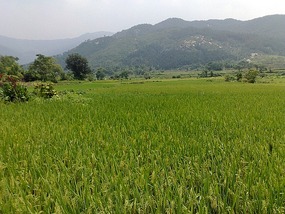
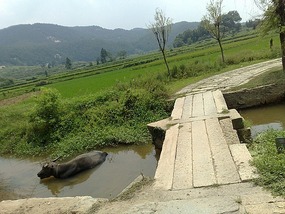
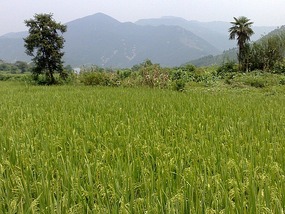
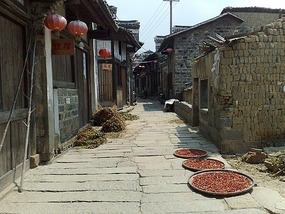
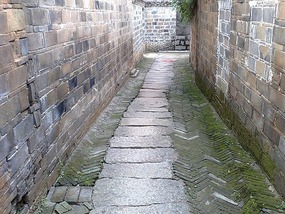
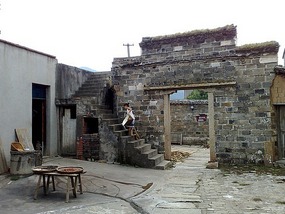
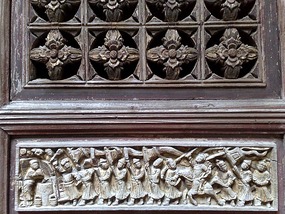
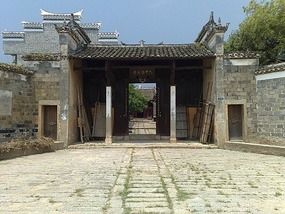
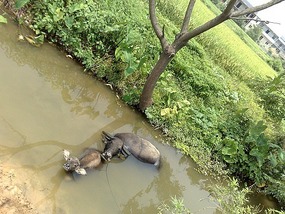
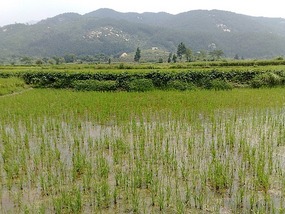
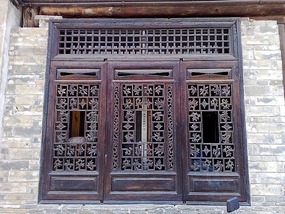
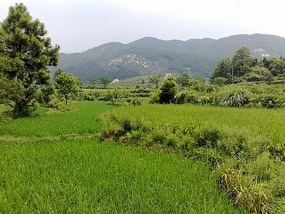
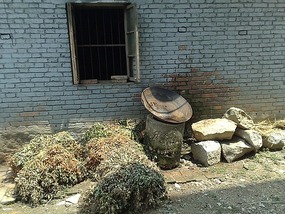
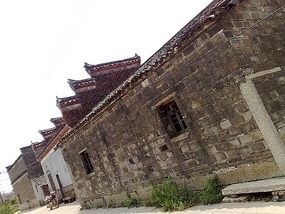
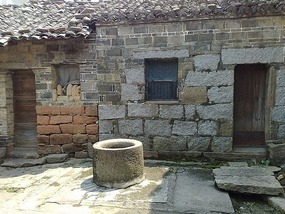
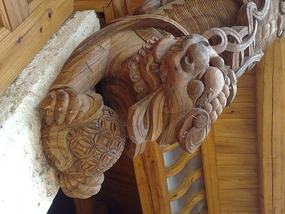
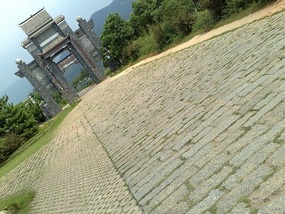
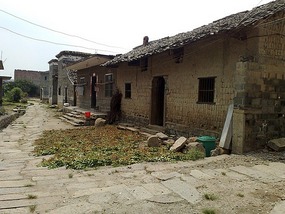
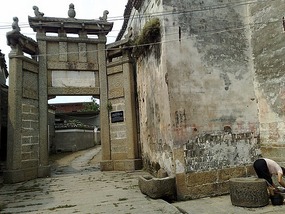
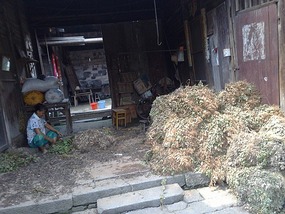
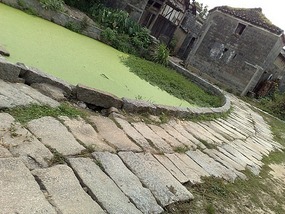
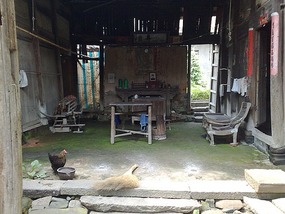
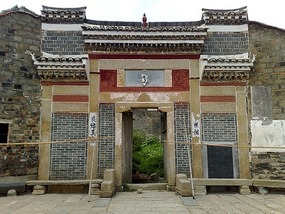
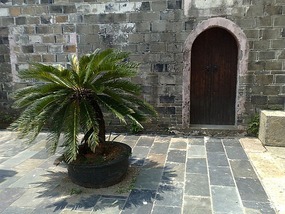
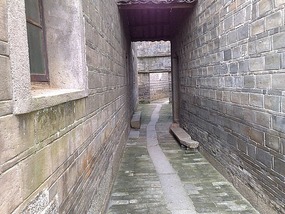
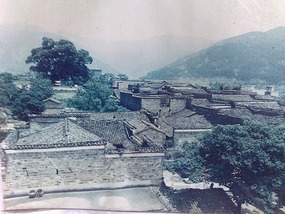
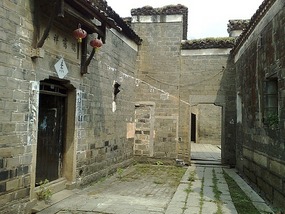
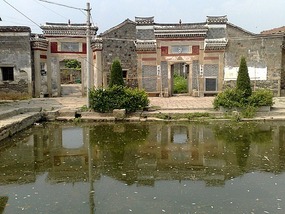
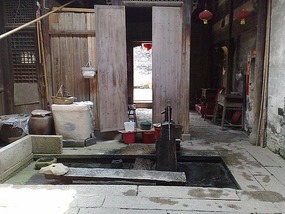
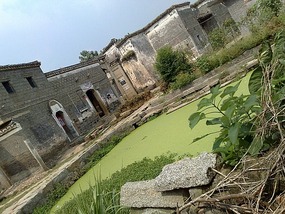
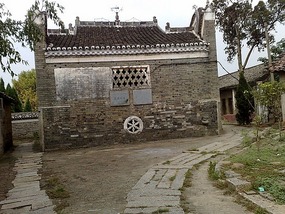
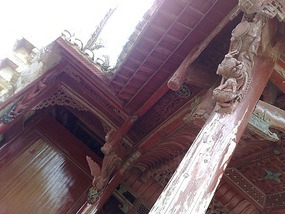
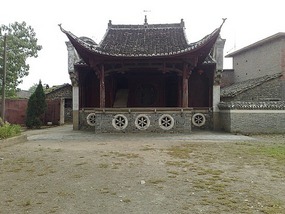
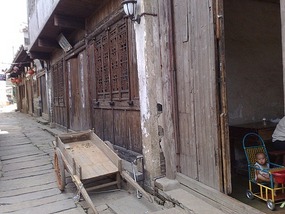
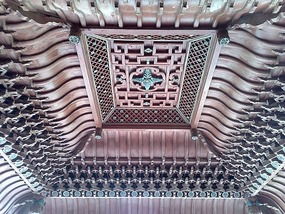
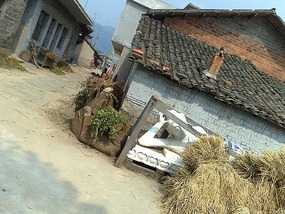
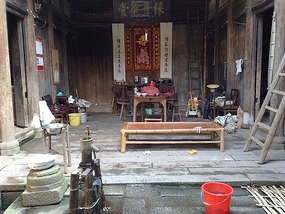
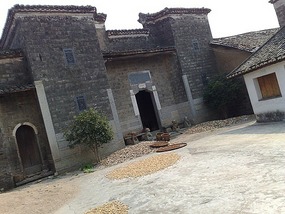
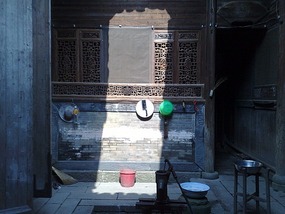
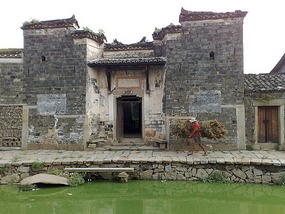
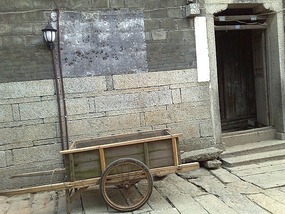
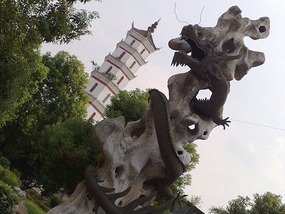
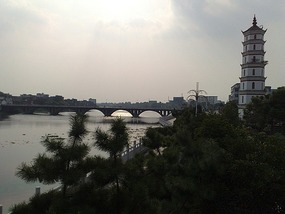
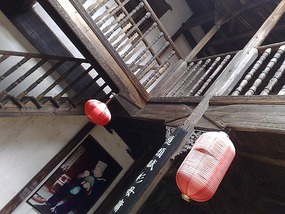
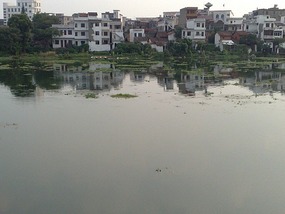
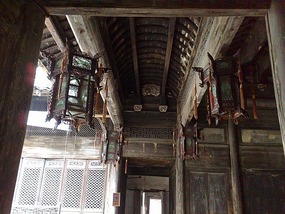
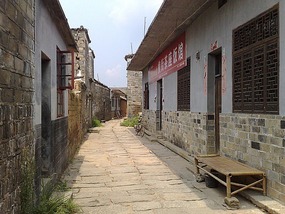
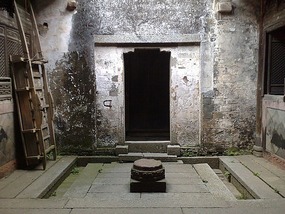
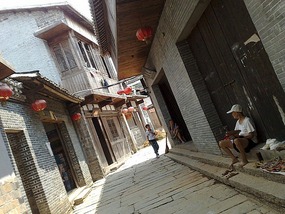
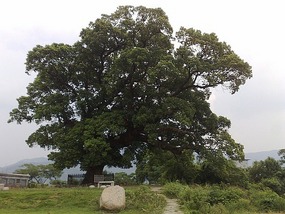

2025-05-22